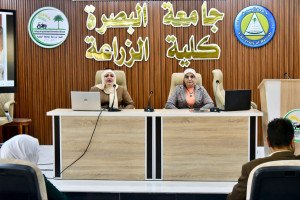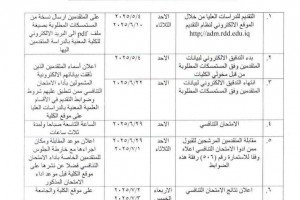
The Department of Food Sciences at the College of Agriculture at the University of Basrah organized a panel discussion that was given by a postgraduate / master’s student (Zainab Shaker Zughayer) about her tagged study (Characterization of fermented sauce proteins and fats and the changes in them due to lactic acid bacteria) under the supervision of (Prof. Dr. Khadija Sadeq Jaafar Al-Husseini) and Prof. Dr. Iman Abdullah Abdul-Ali Al-Emara) and the study presented by the researcher aimed to study the effect of protein and fat decomposition carried out by different types of initiator bacteria such as Lactobacillus plantarum and Lactobacillus bulgaricus in the production of fermented meat such as sauce and others, and to prolong the shelf life Fermented meats give them pleasant flavors that vary with the diversity of the microorganisms responsible for fermentation and the raw fermented product. The study included the manufacture of fermented sauce from beef, microbial tests and the study of the chemical content of sauce after fermentation and ripening, as well as the estimation of lactic acid and the study of physicochemical properties (pH and water carrying capacity) as well as the estimation of the concentrations of amino acids and fatty acids. The proteins of fibrils and sarcoplasms of sauce were separated. The fermented fermented and diagnosed using the electrophoresis technique and studied the percentage of the yield of separated proteins and the functional properties as well as studying the sensory properties of the fermented product. The results of the study showed that there were significant differences at the probability level (P0.05) in the logarithms of the preparation of microorganisms and in all percentages of chemical composition (moisture, protein, fat and ash), lactic acid percentage, physical properties (pH and water carrying capacity values), the yield of fibrils proteins, sarcoplasmic proteins and other properties. Functional (dissolving, water absorption and fat binding) of the sauce product in the stage of fermentation and maturation affected by the incubation period, the percentage of inoculum and the quality of the initiator used in the sauce models. Between the percentage of inoculum and the quality of the initiator used in the sauce models), as well as the triple interaction between the incubation period, the percentage of inoculum and the quality of the initiator used in the sauce models, significant effects in all parameters measured during fermentation and ripening. of beef during the fermentation and maturation stage was high, and also exceeded Models inoculated with Lb. plantarum in improving sensory properties, and the possibility of reducing the microbial load in a sauerkraut model inoculated with initiator bacteria during the stages of fermentation and maturation. The study recommended the use of the initiator bacteria under study, either individually or as a mixture, in the production of sauce, as well as the introduction of the initiator bacteria under study in the various fermented meat products.







